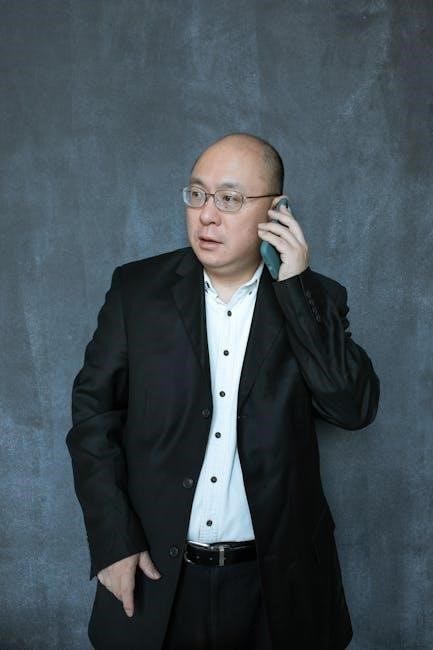dead man’s cell phone script pdf
Dead Man’s Cell Phone, a play by Sarah Ruhl, explores themes of technology, memory, and human connection through a mysterious cell phone in a café.
1.1 Overview of the Play and Its Significance
Dead Man’s Cell Phone is a surreal comedy by Sarah Ruhl, exploring themes of technology, memory, and human connection. The play follows Jean, who answers a dead man’s ringing phone, unraveling a journey of identity and morality. Winner of the Helen Hayes Award, it critiques modern society’s obsession with technology while blending humor and tragedy, making it a thought-provoking commentary on contemporary life.
1.2 Background of Playwright Sarah Ruhl
Sarah Ruhl is a Pulitzer Prize finalist and MacArthur “Genius” Grant recipient, known for her imaginative and poetic plays. Her work often explores themes of identity, death, and human connection. Ruhl’s unique storytelling style blends humor with surrealism, making her one of the most influential playwrights in contemporary American theater, as evident in Dead Man’s Cell Phone.

Plot Summary of “Dead Man’s Cell Phone”
A ringing cell phone in a café propels Jean into a journey involving a dead man, Gordon, uncovering secrets and exploring life, death, and connection through technology.
2.1 The Inciting Incident: The Ringing Cell Phone
The play begins in a quiet café where a stranger’s cell phone rings incessantly. Jean, seated nearby, grows annoyed and decides to answer it, only to discover the owner, Gordon, is dead. This act sets off a chain of events exploring themes of connection, memory, and the consequences of Jean’s impulsive decision.
2.2 The Journey of the Protagonist, Jean
Jean, a responsible yet trapped woman, answers a stranger’s ringing cell phone in a café, leading to the discovery of the dead man, Gordon. Her journey unfolds as she navigates the consequences of her actions, confronting themes of morality, redemption, and the complexities of human connection in a technologically driven world.
2.3 The Mystery of the Dead Man, Gordon
Gordon, the enigmatic dead man, leaves behind a cell phone that becomes a portal to his mysterious life. His death in a café sparks questions about his identity, past, and the unresolved issues he left behind, unraveling a story that intertwines technology, memory, and the human quest for connection and understanding.

Key Themes in “Dead Man’s Cell Phone”
Technology, memory, and mortality intertwine in this play, exploring how modern life’s complexities shape human connections and the quest for meaning in a world dominated by digital communication.
3.1 Technology and Human Connection
The play examines how technology, like the cell phone, bridges gaps between strangers while isolating individuals. Jean’s journey highlights the paradox of modern communication, where devices foster unexpected connections but also deepen loneliness, questioning the true depth of human bonds in a digital age.
3.2 Memory, Mourning, and the Afterlife
The play delves into how technology preserves memories of the dead, allowing the living to mourn and connect with lost loved ones. Jean’s quest to uncover Gordon’s past through his phone explores the afterlife’s digital presence, blending grief with the comfort of virtual remembrance and the enduring impact of human legacy in a technological world.
3.3 Morality and Redemption in a Modern World
Jean’s impulsive act of answering the dead man’s phone sparks a journey of moral responsibility and redemption. As she unravels Gordon’s life, the play examines how technology amplifies human choices, blending guilt, forgiveness, and the pursuit of meaning. It highlights the power of individual actions to reshape lives, offering a poignant commentary on ethics in a tech-driven society.

Main Characters in the Play
Jean, a responsible yet emotionally trapped woman, and Gordon, the enigmatic dead man, drive the story. Their lives intertwine through a cell phone, revealing complex identities and connections.
4.1 Jean: The Responsible yet Trapped Woman
Jean, the protagonist, is a kind-hearted yet introverted woman who feels trapped in her mundane life. Her decision to answer the dead man’s cell phone sets off a transformative journey, revealing her deep-seated desire for connection and control. Through her interactions, Jean’s complexity is unveiled, showcasing her struggle to balance responsibility with personal freedom in a world dominated by technology.
4.2 Gordon: The Enigmatic Dead Man
Gordon, the deceased, is a mysterious figure whose life unravels through his cell phone. His identity and actions reveal a complex character, blending humor with existential questions. The play uses his death as a catalyst to explore themes of memory and connection, leaving Jean and the audience to piece together his enigmatic legacy and its impact on those around him.
4.3 Other Characters: Their Roles and Significance
Other characters, such as those from Gordon’s life and strangers Jean encounters, provide depth to the narrative. They reveal aspects of Gordon’s identity and his impact on others, while also illustrating the broader themes of memory, connection, and technology’s role in human relationships, enriching the play’s emotional and philosophical layers through their interactions and dialogues.

Availability of the Script in PDF Format
The Dead Man’s Cell Phone script is freely available as a PDF download from various online sources, including Google Drive, Scribd, and designcodeloop.net, ensuring easy access for readers worldwide.
5.1 Sources for Downloading the Script
The Dead Man’s Cell Phone script in PDF is available for free download on platforms like Google Drive, Scribd, and designcodeloop.net. It spans 59 pages, offering a complete view of the play for study or theatrical purposes. Ensure to access from trusted sources to avoid copyright issues while exploring Sarah Ruhl’s imaginative storytelling and unique character development.
5.2 Legal and Free Options for Accessing the PDF
The Dead Man’s Cell Phone script PDF is legally available for free download through platforms like Google Drive, Scribd, and designcodeloop.net. These sources provide access without infringing on copyright laws, making it easy for students, theater enthusiasts, and educators to explore Sarah Ruhl’s work for study or production purposes.

Analysis of the Play’s Script
The Dead Man’s Cell Phone script explores themes of technology, memory, and human connection through a surreal narrative, blending humor with philosophical depth.
6.1 Dramatic Structure and Style
Dead Man’s Cell Phone features a unique blend of realism and surrealism, with Sarah Ruhl employing a non-linear narrative. The play begins in a café with a ringing phone, escalating into a fantastical journey. Ruhl’s style combines humor, emotional depth, and philosophical queries, using the cell phone as a symbolic catalyst for exploring life, death, and human connections in a modern world.
6.2 Symbolism of the Cell Phone
The cell phone in Dead Man’s Cell Phone symbolizes the bridge between life and death, serving as a catalyst for human connection. It represents the pervasive role of technology in modern life, while also embodying themes of memory, identity, and redemption. The phone’s incessant ringing drives the narrative, reflecting society’s obsession with communication and its impact on personal relationships.
6.3 Humor and Surrealism in the Play
Dead Man’s Cell Phone blends dark humor with surrealism, creating a unique narrative voice. The play’s absurdity, such as Jean’s bizarre journey, adds comedic relief while exploring deeper themes. The cell phone’s incessant ringing and Jean’s eccentric encounters with strangers highlight the play’s quirky tone, balancing lighthearted moments with profound reflections on life, death, and modern society.

Theatrical Productions and Reviews
Dead Man’s Cell Phone has been staged in various productions, including at South Coast Repertory, receiving mixed reviews for its bold premise and quirky execution.
7.1 Notable Productions and Their Reception
Dead Man’s Cell Phone premiered at Woolly Mammoth Theatre Company, praised for its surreal humor and exploration of modern technology’s impact on human relationships. The South Coast Repertory production received acclaim for its innovative staging and Sarah Ruhl’s unique storytelling, solidifying the play’s reputation as a thought-provoking contemporary theater piece.
7.2 Critical Acclaim and Controversies
Dead Man’s Cell Phone received widespread critical acclaim for its unique blend of surrealism and humor, with praise for Sarah Ruhl’s inventive storytelling. The play won the Helen Hayes Award for Outstanding New Play in 2007. While some critics noted its unconventional structure, many hailed it as a bold exploration of modern life, death, and technology’s role in human connections.

Why Read the “Dead Man’s Cell Phone” Script?
Dead Man’s Cell Phone offers a unique exploration of technology’s impact on human connections, blending humor with profound insights into memory, mourning, and redemption in modern society.
8.1 Insights into Modern Society
Dead Man’s Cell Phone provides a thought-provoking commentary on modern society, exploring themes such as technology-induced isolation, the blur between life and death, and the human quest for connection. The play’s surreal humor and imaginative storytelling reveal how technology shapes our relationships, memories, and understanding of morality in a world dominated by digital communication.
8.2 Unique Storytelling and Character Development
Dead Man’s Cell Phone captivates with its unique storytelling, blending surreal humor and emotional depth. Jean’s journey from an ordinary woman to an unexpected hero explores themes of identity and connection. The play’s imaginative structure and character development offer fresh perspectives on morality, redemption, and the human condition, making it a compelling and memorable read.

Comparison with Other Works by Sarah Ruhl
Dead Man’s Cell Phone shares Ruhl’s signature blend of surrealism and emotional depth, akin to her other works like The Clean House. It explores identity and memory through unique storytelling.
9.1 Similar Themes and Styles
Dead Man’s Cell Phone mirrors Ruhl’s other works, like The Clean House and Eurydice, in exploring themes of identity, memory, and the afterlife. Her signature magical realism and poetic dialogue create a unique emotional landscape, blending the mundane with the surreal. This play, like her others, delves into human connection and existential questions, offering a distinctive narrative style that captivates audiences and sparks reflection.
9.2 Evolution of Ruhl’s Playwriting
Sarah Ruhl’s playwriting evolves in Dead Man’s Cell Phone, showcasing her growth in blending surrealism and humor. Compared to earlier works like The Clean House, this play delves deeper into modern anxieties, using technology as a metaphor for human disconnection. Her unique voice remains consistent, but her exploration of moral complexities and emotional depth reflects a maturing artistry, further solidifying her reputation as a contemporary playwright.
Educational Use of the Script
The Dead Man’s Cell Phone script is widely used in schools for analyzing themes, character development, and dramatic structure. Its unique storytelling aids students in critical thinking and creative writing, making it a valuable resource for theater and literature curricula.
10.1 Study Guides and Analysis Tools
Study guides for Dead Man’s Cell Phone provide in-depth analyses of themes, characters, and dramatic structure. These tools are available as downloadable PDFs, offering insights into Ruhl’s unique storytelling and its educational relevance. They include discussion questions, character maps, and thematic breakdowns, making them invaluable for students and educators studying the play’s modern themes and theatrical techniques.
10.2 Use in Theater and Literature Classes
The Dead Man’s Cell Phone script is widely used in theater and literature classes for its exploration of modern themes like technology’s impact on human connection and memory. Its surreal humor and symbolic elements make it ideal for analyzing dramatic structure and character development, while its PDF availability enhances accessibility for educational purposes and structured analysis.
The Play’s Impact on Contemporary Theater
Dead Man’s Cell Phone has influenced modern theater by blending surrealism and humor, challenging traditional norms and inspiring innovative storytelling in contemporary playwriting and performance trends.
11.1 Influence on Modern Playwriting
Dead Man’s Cell Phone has reshaped narrative techniques in contemporary theater, inspiring playwrights to experiment with surrealism and blending technology with human emotion. Its unique structure and imaginative storytelling have encouraged a new wave of innovative playwriting, challenging traditional norms and fostering creativity in the theatrical community.
11.2 Cultural and Social Relevance
Dead Man’s Cell Phone reflects modern societal concerns about technology’s role in human interaction. It explores how devices both connect and isolate us, resonating with contemporary anxieties about identity, memory, and redemption. The play’s themes of grief, morality, and the digital age spark meaningful conversations, making it a culturally significant work that mirrors our shared struggles and aspirations in a tech-driven world.

Frequently Asked Questions About the Script
Dead Man’s Cell Phone script is widely available as a free PDF download, spanning 59 pages. Common queries include its themes, character dynamics, and legal access options, ensuring a seamless reading experience for theater enthusiasts and scholars alike.
12.1 Common Queries and Misconceptions
Common questions about the script include its availability, themes, and character dynamics. Misconceptions often arise about its legality and accessibility. The PDF is widely available for free, with 59 pages, and legally downloadable from trusted sources. It delves into themes like technology’s impact and human connections, often sparking curiosity about its surreal storytelling and unique character development.
12.2 Clarifications on Plot and Characters
Jean, a responsible woman, answers a dead man’s phone, sparking a journey into his life. Gordon, the enigmatic deceased, leaves behind unanswered questions. The play explores themes of memory, mourning, and redemption, blending surrealism with humor. Supporting characters add depth, highlighting societal connections in a technologically driven world. The script delves into Jean’s transformation and the mystery surrounding Gordon’s life.
Dead Man’s Cell Phone leaves a lasting impact, blending humor and surrealism to explore technology’s role in human connection. Its unique storytelling and themes make it a compelling read for modern audiences.
13.1 The Lasting Legacy of “Dead Man’s Cell Phone”
Dead Man’s Cell Phone has left a profound mark on contemporary theater, blending humor and surrealism to explore themes of technology and human connection. Its unique storytelling and thought-provoking ideas continue to resonate, making it a significant work in modern playwriting. The script’s availability in PDF has further cemented its educational and cultural relevance, ensuring its legacy endures in both academic and theatrical contexts.
13.2 Encouragement to Explore the Script
Exploring Dead Man’s Cell Phone offers a unique blend of humor, surrealism, and deep reflection on modern life. Sarah Ruhl’s acclaimed play challenges readers to think critically about technology’s role in human connections. With its thought-provoking themes and imaginative storytelling, the script is a must-read for anyone interested in contemporary theater and its cultural relevance. The free PDF availability makes it easily accessible for deeper exploration and study.
